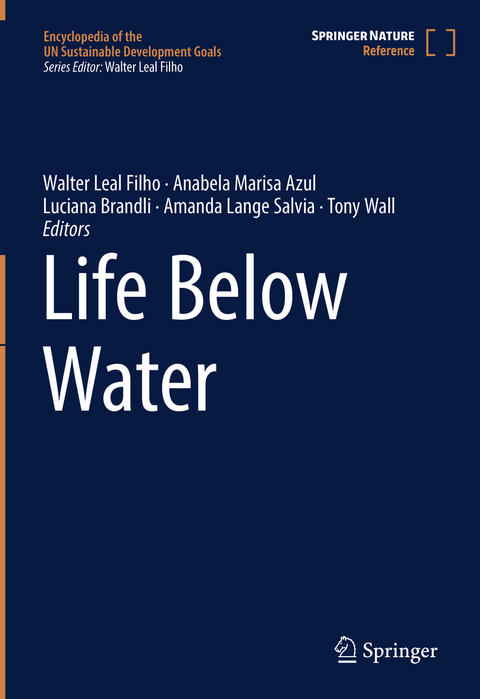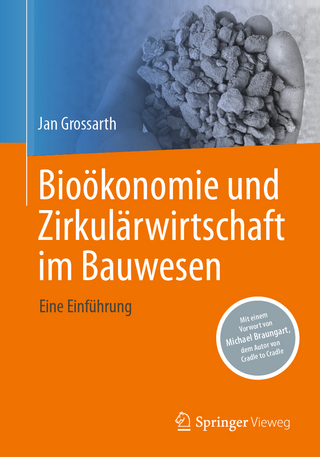
Life Below Water
Springer International Publishing (Verlag)
978-3-319-98535-0 (ISBN)
The problems related to the process of industrialisation such as biodiversity depletion, climate change and a worsening of health and living conditions, especially but not only in developing countries, intensify. Therefore, there is an increasing need to search for integrated solutions to make development more sustainable. The United Nations has acknowledged the problem and approved the "2030 Agenda for Sustainable Development". On 1st January 2016, the 17 Sustainable Development Goals (SDGs) of the Agenda officially came into force. These goals cover the three dimensions of sustainable development: economic growth, social inclusion and environmental protection.
The Encyclopedia of the UN Sustainable Development Goals comprehensively addresses the SDGs in an integrated way. It encompasses 17 volumes, each one devoted to one of the 17 SDGs. This volume is dedicated to SDG 14 "Conserve and sustainably use the oceans, seas and marine resources for sustainable development". Marine and coastal bio-resources, play an essential role in human well-being and social and economic development. This volume addresses this sustainability challenge providing the description of a range of terms, which allows a better understanding and fosters knowledge about it.Concretely, the defined targets are:
- Prevent and significantly reduce marine pollution of all kinds, in particular from land-based activities, including marine debris and nutrient pollution
- Sustainably manage and protect marine and coastal ecosystems to avoid significant adverse impacts, including by strengthening their resilience, and take action for their restoration in order to achieve healthy and productive oceans
- Minimize and address the impacts of ocean acidification, including through enhanced scientific cooperation at all levels
- Effectively regulate harvesting and end overfishing, illegal, unreported and unregulated fishing and destructive fishing practices and implement science-based management plans, in order to restore fish stocks in the shortest time feasible, at least to levels that can produce maximum sustainable yield as determined by their biological characteristics
- Conserve at least 10 per cent of coastal and marine areas, consistent with national and international law and based on the best available scientific information
- Prohibit certain forms of fisheries subsidies which contribute to overcapacity and overfishing, eliminate subsidies that contribute to illegal, unreported and unregulated fishing and refrain from introducing new such subsidies, recognizing that appropriate and effective special and differential treatment for developing and least developed countries should be an integral part of the World Trade Organization fisheries subsidies negotiation 16
- Increase the economic benefits to small island developing states and least developed countries from the sustainable use of marine resources, including through sustainable management of fisheries, aquaculture and tourism
- Increase scientific knowledge, develop research capacity and transfer marine technology, taking into account the Intergovernmental Oceanographic Commission Criteria and Guidelines on the Transfer of Marine Technology, in order to improve ocean health and to enhance the contribution of marine biodiversity to the development of developing countries, in particular small island developing states and least developed countries
- Provide access for small-scale artisanal fishers to marine resources and markets
- Enhance the conservation and sustainable use of oceans and their resources by implementing international law as reflected in the United Nations Convention on the Law of the Sea, which provides the legal framework for the conservation and sustainable use of oceans and their resources, as recalled in pa
Walter Leal Filho (BSc, PhD, DSc, DPhil, DEd, DL, DLitt) is a Senior Professor and Head of the Research and Transfer Centre "Sustainable Development and Climate Change Management" at Hamburg University of Applied Sciences in Germany, and Chair of Environment and Technology at Manchester Metropolitan University, UK. He is the initiator of the Word Sustainable Development Symposia (WSSD-U) series, and chairs the Inter-University Sustainable Development Research Programme. Professor Leal Filho has written, co-written, edited or co-edited more than 400 publications, including books, book chapters and papers in refereed journals. Anabela Marisa Azul is a Researcher at the Center for Neuroscience and Cell Biology (CNC) and the Institute for Interdisciplinary Research of the University of Coimbra (UC, Portugal). She holds a Ph.D. in Biological Sciences, specializing in Ecology (2002, UC), and pursued her investigation on biology and ecology of fungi to pinpoint the role of mycorrhizal symbiosis for sustainability of Mediterranean forests under different land use scenarios at the Centre for Functional Ecology (CFE-UC), where she became an Associate Researcher (from 2009 to 2014). At CFE-UC, Marisa Azul developed a holistic approach that combined innovation in food production with sustainable development and public scientific awareness to multiple actors. At CNC, from 2014 on, Marisa Azul focuses her investigation on basic research and participatory research dynamics to pinpoint links between metabolism, health/disease, and sustainability. She has broad academic experience as a researcher working in participatory research and interdisciplinary that link biomedical and life/environmental sciences, social sciences, science education, science communication, and artistic forms. Her research interests also lie in bringing together the academy and social/economical players. She has been successful in attracting national and international funding, coordinating projects, and mentoring young researchers on the topics mentioned. She has co-authored over 40 scientific publications and book chapters, co-edited 4 books on Climate Change Management Series and 1 onWorld Sustainability Series published by Springer, co-authored 4 books for children and 2 comics, and co-produced 1 animation. Luciana Brandli, Ph.D., is an Associate Professor in the University of Passo Fundo, Brazil, working in the Ph.D. Program in Civil and Environment Engineering. Her current research interests include sustainability in higher education and green campus, management of urban infrastructure and sustainable cities, and the Agenda 2030 for sustainable development. She supervises a number of Master's and Doctoral students on engineering and environment and sustainability issues and has in excess of 300 publications, including books, book chapters, and papers in refereed journals. Pinar Gökçin Özuyar is a Faculty Member of Faculty of Economics, Administrative and Social Sciences at Istinye University, Istanbul, Turkey. She received her B.S. degree in Environmental Engineering from Istanbul Technical University in 1992 and M.S. and Ph.D. degrees from Bogazici University Institute of Environmental Sciences, Istanbul, Turkey. Her Ph.D. thesis was based on the "Thermodynamic Analysis of Treatment Plants for Producing Energy from SolidWaste" which she conducted in Germany with a joint scholarship from Forschungzentrum Jülich and TUBITAK (NationalScience Foundation of Turkey). Defining herself as a pracademic, she has more than 25 years of experience not only in academia but also in the private sector working on environment and sector-specific activities in Turkey and Dubai (UAE). She has extensive expertise specifically in environmental auditing according to World Bank Standards which is required for international financi
Adaptation to Sea-Level Rise and Sustainable Development Goals.- Antarctic: Climate Change, Fisheries, and Governance.- Antarctica and NE Greenland: Marine Pollution in a Changing World.- Aquaculture: Farming Our Food in Water.- Artisanal Fisheries: Management and Sustainability.- Artisanal Fishing Gears and Sustainable Development.- Biological Invasions as a Threat to Global Sustainability.- Blue Bioeconomy and the Sustainable Development Goals.- Bycatch: Causes, Impacts, and Reduction of Incidental Captures.- Cetacean Health: Global Environmental Threats.- CO 2-Induced Ocean Acidification.- Coastal Defenses and Engineering Works.
| Erscheinungsdatum | 04.04.2022 |
|---|---|
| Reihe/Serie | Encyclopedia of the UN Sustainable Development Goals |
| Zusatzinfo | XXX, 1110 p. 267 illus., 242 illus. in color. |
| Verlagsort | Cham |
| Sprache | englisch |
| Maße | 178 x 254 mm |
| Gewicht | 2310 g |
| Themenwelt | Naturwissenschaften ► Biologie ► Ökologie / Naturschutz |
| Naturwissenschaften ► Geowissenschaften | |
| Sozialwissenschaften ► Politik / Verwaltung | |
| Schlagworte | Fishing and Fishing Practices • Marine and coastal ecosystems • marine pollution • Marine Technology • Ocean Acidification • Overfishing • sustainability • sustainable aquaculture • sustainable development |
| ISBN-10 | 3-319-98535-3 / 3319985353 |
| ISBN-13 | 978-3-319-98535-0 / 9783319985350 |
| Zustand | Neuware |
| Haben Sie eine Frage zum Produkt? |
aus dem Bereich


